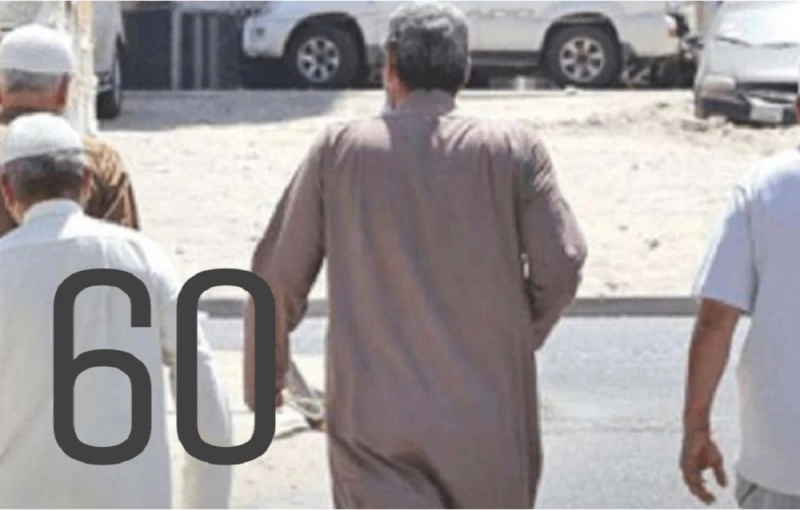Latest News
- Shortage Of Fishermen Leads To Mullet Scarcity In Fish Market
- Unknown Woman Swaps Real Gold For Fakes In Jahra
- Fire Department Shuts Down 54 Shops For Safety Violations
- Man Sentence To Death For Killing Father Under Influence Of Drug...
- Weekend Temperatures In Kuwait To Reach 50°C
- 64,000 Traffic Violations Issued In A Week
- MoE Explores Special Classes For Students With Learning Difficul...
- Kuwaiti Doctors Recorded The Highest Pass In Specialization Exam...
- PART Launches SCADA System For Rainy Season Prep
- Health Ministry Refutes Rumors On New Infectious Diseases Hospit...
- MoH Deploys Mobile Generators For Uninterrupted Healthcare Servi...
- Kuwait Is Expecting A Budget Deficit Of $18 Billion
Over-60 Expats Eagerly Await New Fee Regulations In Kuwait

The issue of high fees for renewing the work permit of the so-called non-graduate workers over the age of sixty has been the source of widespread controversy. Government agencies have imposed these fees, leading to concerns about their impact on the labor market and the investment climate.
According to sources, the decision is expected to be reconsidered for the benefit of these workers. Continuing to impose these fees deprives the labor market of real expertise and competent people, sending a negative message to potential investors and leading to a decline in investments, say sources.
The 250 dinars this category of workers has to pay to renew the work permit, in addition to obtaining a health insurance policy from a private hospital or insurance company, are part of policies aimed at reducing the large foreign workforce and promoting citizen employment in various sectors.
Following the implementation of this decision informed sources told the daily that there is an expectation that the decision may be reviewed to offer some ‘relief’ to this category of workers, especially considering the upcoming projects and the potential for attracting capital and investors.
Many workers over sixty are highly experienced and competent in their respective fields. Continuing to impose these fees risks losing this valuable expertise, which negatively affects the quality of work in vital sectors. The high fees also increase operating costs for companies, especially SMEs (small and medium enterprises), potentially leading to reduced employment or even company closures. This, in turn, negatively impacts the overall economy and increases the prices of services or salaries for these workers.
One of the key factors attracting foreign investments is encouraging the business environment. To address this, there may be a need to increase exceptions for some vital sectors that rely heavily on foreign expertise.
This would help maintain the quality of services provided in these areas. Dual policies can be adopted to stimulate the employment of Kuwaitis while attracting necessary foreign talent. Such policies could include training and qualification programs for citizens and creating a stimulating work environment for all, say sources.
The issue of over 60 workers requires a careful balance between improving the labor market and protecting the economy from negative influences. By reconsidering policies and adopting measures that support investments, Kuwait can ensure a balanced and attractive work environment for talent and investors, enhancing its economic stability and growth.
Fahd Al-Arbash, head of the Restaurant Owners Union, emphasized that excluding workers over sixty from the labor market, despite their vast experience, negatively affects productivity and the economy. He said the developed countries do not impose strict age restrictions but regulate working age by the constitution and law. Experience and creativity are crucial for professional workers who continue to innovate past sixty.
Al-Arbash highlighted that the departure of workers without the employer’s permission causes irreparable damage and exposes the employer to risks. Al-Arbash called for amending the law to better regulate employment in the private sector, similar to the government sector. He noted that human resources managers have sensitive powers, such as accessing electronic systems and approving transfers, which, if misused, could lead to legal accountability.
Therefore, these powers must be clearly defined and responsibly managed. Al-Arbash urged the amendment of Articles (44 and 64) of the Labor Law in the Private Sector. He proposed that Article (44) should allow for the termination of an indefinite-term employment contract for a legitimate reason with written notice to the other party 30 days before terminating the contract, with a one-week notice for other workers.
By Fares Al-Abdan
Al-Seyassah/Arab Times Staff
Trending News
-
 Kuwait Lifted The Ban On Filipino Workers
23 June 2024
Kuwait Lifted The Ban On Filipino Workers
23 June 2024 -
 Kuwait Relaxes Family Sponsorship Rules
30 June 2024
Kuwait Relaxes Family Sponsorship Rules
30 June 2024 -
 2 Hours Power Cut In Multiple Areas Of Kuwait Betw...
20 June 2024
2 Hours Power Cut In Multiple Areas Of Kuwait Betw...
20 June 2024 -
 Kuwait To Lift Ban On Transfer Of Domestic Help Vi...
26 June 2024
Kuwait To Lift Ban On Transfer Of Domestic Help Vi...
26 June 2024 -
 Crackdown On Building Violations In Kuwait Followi...
27 June 2024
Crackdown On Building Violations In Kuwait Followi...
27 June 2024 -
 Kuwaiti Woman Beaten To Death
29 June 2024
Kuwaiti Woman Beaten To Death
29 June 2024 -
 Kuwait To Add 1,200 Megawatts To Address Electrici...
22 June 2024
Kuwait To Add 1,200 Megawatts To Address Electrici...
22 June 2024 -
 Kuwait Municipality Blocks 245 Buildings In Farwan...
24 June 2024
Kuwait Municipality Blocks 245 Buildings In Farwan...
24 June 2024 -
 Security Campaigns And Checkpoints Will Be Set Up...
24 June 2024
Security Campaigns And Checkpoints Will Be Set Up...
24 June 2024 -
 Expat With Fake Passport Died Of Heart Attack
01 July 2024
Expat With Fake Passport Died Of Heart Attack
01 July 2024











Comments Post Comment